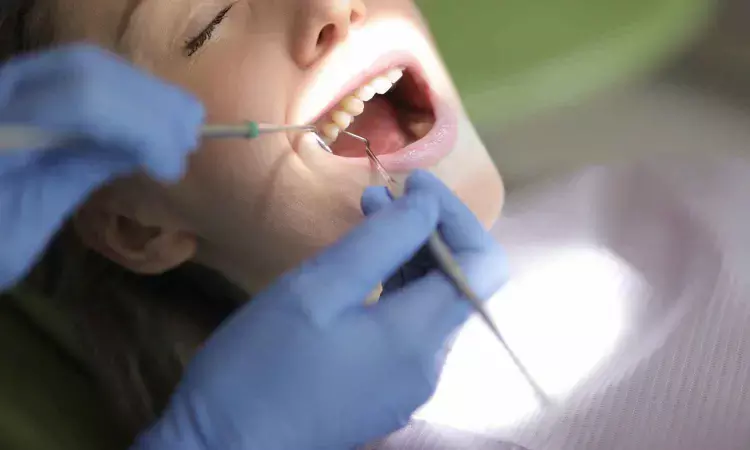- Home
- Medical news & Guidelines
- Anesthesiology
- Cardiology and CTVS
- Critical Care
- Dentistry
- Dermatology
- Diabetes and Endocrinology
- ENT
- Gastroenterology
- Medicine
- Nephrology
- Neurology
- Obstretics-Gynaecology
- Oncology
- Ophthalmology
- Orthopaedics
- Pediatrics-Neonatology
- Psychiatry
- Pulmonology
- Radiology
- Surgery
- Urology
- Laboratory Medicine
- Diet
- Nursing
- Paramedical
- Physiotherapy
- Health news
- Fact Check
- Bone Health Fact Check
- Brain Health Fact Check
- Cancer Related Fact Check
- Child Care Fact Check
- Dental and oral health fact check
- Diabetes and metabolic health fact check
- Diet and Nutrition Fact Check
- Eye and ENT Care Fact Check
- Fitness fact check
- Gut health fact check
- Heart health fact check
- Kidney health fact check
- Medical education fact check
- Men's health fact check
- Respiratory fact check
- Skin and hair care fact check
- Vaccine and Immunization fact check
- Women's health fact check
- AYUSH
- State News
- Andaman and Nicobar Islands
- Andhra Pradesh
- Arunachal Pradesh
- Assam
- Bihar
- Chandigarh
- Chattisgarh
- Dadra and Nagar Haveli
- Daman and Diu
- Delhi
- Goa
- Gujarat
- Haryana
- Himachal Pradesh
- Jammu & Kashmir
- Jharkhand
- Karnataka
- Kerala
- Ladakh
- Lakshadweep
- Madhya Pradesh
- Maharashtra
- Manipur
- Meghalaya
- Mizoram
- Nagaland
- Odisha
- Puducherry
- Punjab
- Rajasthan
- Sikkim
- Tamil Nadu
- Telangana
- Tripura
- Uttar Pradesh
- Uttrakhand
- West Bengal
- Medical Education
- Industry
Hypochlorous acid Emerges as Promising Dentin Conditioner for CAD Applications: Study

Researchers have found in a new study that Hypochlorous acid (HOCl) had potential as a dentin conditioner, offering enhanced bond performance and durability in caries affected dentin restorations, along with antibacterial benefits and maintained biocompatibility.
A study was done to evaluate the effects of hypochlorous acid (HOCl) conditioning on bond strength to caries-affected dentin (CAD), antibacterial efficacy against Streptococcus mutans (S. mutans), and dental pulp cell compatibility. Extracted human molars with occlusal caries were pretreated with 50 ppm HOCl before adhesive application (Clearfil SE Bond 2), with untreated specimens serving as controls. Microtensile bond strength (µTBS) was evaluated after 24-hour storage and 10,000 thermocycles.
Antibacterial efficacy was assessed by colony-forming unit (CFU) enumeration following S. mutans incubation with HOCl solution. Rat dental pulp cells were cultured with HOCl at concentrations of 0, 0.5, 1, 5, 10, and 50 ppm. Cell viability was assessed using Cell Counting Kit-8. Data underwent statistical analysis using one-way ANOVA with Tukey’s post hoc test (α = 0.05). HOCl pretreatment significantly enhanced µTBS to CAD (from 25.6 ± 4.3 to 35.8 ± 7.2, p < 0.001) and maintained bond stability after thermocycling (32.1 ± 4.5, p > 0.05). HOCl demonstrated significant antibacterial efficacy against S. mutans with substantial reduction of viable bacteria (p < 0.001).
Additionally, HOCl maintained compatibility with dental pulp cells. HOCl shows a promise as a dentin conditioner, offering enhance bond performance to CAD with improved bond durability, while providing antibacterial benefits and maintaining biocompatibility.
Reference:
Sanon, K., Elseoudy, N., Hiraishi, N. et al. Hypochlorous acid as a potential cavity conditioner for caries-affected dentin. Sci Rep 15, 21438 (2025). https://doi.org/10.1038/s41598-025-06191-7
Dr. Shravani Dali has completed her BDS from Pravara institute of medical sciences, loni. Following which she extensively worked in the healthcare sector for 2+ years. She has been actively involved in writing blogs in field of health and wellness. Currently she is pursuing her Masters of public health-health administration from Tata institute of social sciences. She can be contacted at editorial@medicaldialogues.in.
Dr Kamal Kant Kohli-MBBS, DTCD- a chest specialist with more than 30 years of practice and a flair for writing clinical articles, Dr Kamal Kant Kohli joined Medical Dialogues as a Chief Editor of Medical News. Besides writing articles, as an editor, he proofreads and verifies all the medical content published on Medical Dialogues including those coming from journals, studies,medical conferences,guidelines etc. Email: drkohli@medicaldialogues.in. Contact no. 011-43720751


